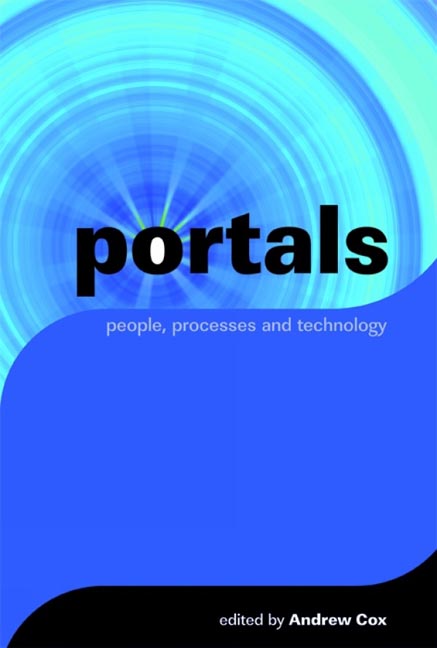Book contents
- Frontmatter
- Contents
- Introductory preface
- Section 1 Core themes
- 1 Definitions and debates
- 2 Portals or filters? Identifying quality on the internet
- 3 Portal architectures
- 4 Personalization initiatives in the public and academic domains
- 5 User needs analysis and evaluation of portals
- 6 Managing portal services
- Section 2 The library and the portal
- Section 3 The portal in the corporate sector
- Section 4 Portals in the public sector
- Section 5 The future
- The contributors
- Index
2 - Portals or filters? Identifying quality on the internet
from Section 1 - Core themes
Published online by Cambridge University Press: 09 June 2018
- Frontmatter
- Contents
- Introductory preface
- Section 1 Core themes
- 1 Definitions and debates
- 2 Portals or filters? Identifying quality on the internet
- 3 Portal architectures
- 4 Personalization initiatives in the public and academic domains
- 5 User needs analysis and evaluation of portals
- 6 Managing portal services
- Section 2 The library and the portal
- Section 3 The portal in the corporate sector
- Section 4 Portals in the public sector
- Section 5 The future
- The contributors
- Index
Summary
Introduction
This chapter looks at the changing role of portals, and considers what function they may serve in the future.
It is common for new technologies to be understood by relating them to older, more familiar technologies. Two consequences of this tendency are discussed: problems associated with the new technology's adoption might be ignored, and opportunities that are afforded by it are sometimes overlooked.
In the case of the internet, comparisons with print and broadcast media often ignore the fact that such means of information exchange are subject to a greater degree of quality control than the internet. They are also, however, far more constrained and less accessible than the internet.
Portals, it is argued, can help to compensate for the loss of some of the quality control mechanisms associated with other media, while allowing a level of discussion and exchange that would not previously have been possible.
A change of role
In July 1999, the retail outlet Dixons floated 20% of its Internet Service Provider, Freeserve (DSG International, 2005). The Dot Com bubble was inflating nicely at the time; Freeserve (now Wanadoo) had over a million subscribers, and there was considerable interest in the flotation (Fleming,1999).
In the preceding year, it had become conventional wisdom
that ‘portals’ would be the means whereby corporations would capture the hearts and minds of consumers …. They were therefore expected by this particular round of soothsayers to command high advertising-rates and click-through fees, plus commissions on resulting sales.
(Clarke, 1999)The Freeserve flotation was part of what Tim Berners-Lee (1999) refers to as ‘the battle of the portals’. At the time, I remember hearing an interview with a financial pundit who expressed the view that the shares would be a good investment. Freeserve, he explained, provided a way into the internet for over a million users, and with such a large potential audience, advertisers would be as interested in Freeserve as they would in a television channel.
As McLuhan (1964) observed, a common way of coming to terms with a new technology is to relate it to an existing one:
people feel compelled to look at new situations as if they were old ones (33).
- Type
- Chapter
- Information
- Portalspeople, processes and technology, pp. 14 - 23Publisher: FacetPrint publication year: 2006



